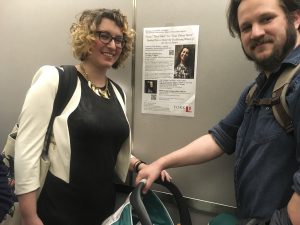In October 2017, professional communicator, and designer of #ThatOtherShirt, Elly Zupko, came to Toronto with her family, to give the 3rd International Ada Lovelace Day Lecture (see her great talk above).
International Ada Lovelace Day is one of several initiatives, such as Soapbox Science, founded by women in the last 10 years, with the aim of raising awareness of the women in the fields of science, technology, engineering and mathematics (STEM), whose work, we increasingly know, has been frequently ignored or downplayed.
In my fifth decade since I arrived at the University of Toronto, I find myself, again, taking lots of public action for the work of women to be properly recognized, and for STEM fields to be more inclusive. As a Biology and Geography undergraduate in the 1970s, I was quite familiar with the under-representation of women in some STEM fields. I read books by second wave feminists such as Germaine Greer, Gloria Steinem, and others. I also learned about Simone de Beauvoir, and considered myself a feminist.
As a graduate student in the 1980s, I observed and learned about the under-representation of women in mid-career and senior academic and research positions. I spent a lot of time discussing the relative merits of all-women colleges at the University of Oxford, where I was at St. Hugh's and Somerville. In conversations, I always advocated that these colleges stay single-sex, until mixed colleges upped their intake of female students. I also got a good look at sexual harassment, and the failure of people in power to take action in response to complaints by students who witnessed the harassment.
As an assistant and associate professor in the 1990s, I was confident that government-led policy documents, and initiatives, such as NSERC's WUFA programme, would address what we then called the Leaky Pipeline, which David Miller has argued, is a flawed metaphor. I sat on daycare boards, and called for federal support for non-profit daycares in Canada, which I knew would improve the lot of all working parents. This hasn't happened yet.
@10dollardaycare @shelleycarroll @PeggyNashNDP Hooray! I found my 1999 @MacleansMag Op-Ed letter on #Daycare reform pic.twitter.com/8MTEOhLGyb
— Dawn Bazely (@dawnbazely) November 21, 2013
As an associate professor in the 2000s, juggling a family, field work and teaching, I experienced, and wrote about the chilly climate for women in my university's STEM departments.

Elly Zupko came to Toronto with her family to give the 3rd International Ada Lovelace Day talk (below)
In the 2010s, as a full professor, and now University Professor, I read the research literature on equity, diversity and inclusivity, including that on implicit and unconscious bias. I have always had many friends who are feminist-scholars in disciplines, such as history, and this year, I am co-authoring a chapter on women who were earning income from botany in Ontario, from 1870 to 1915. As a result of what I have learned, I both write about ongoing EDI challenges faced by women in STEM, and I take actions.
One of these actions includes working with John Dupuis and Marisa Sterling to bring International Ada Lovelace Day to York University, and Canadian Higher Education in a sustained way. This year, York University marked its third celebration of Ada Lovelace Day with a Wikipedia Editathon, and a superb talk by Elly Zupko, which she also gave at the University of Toronto, Scarborough, hosted by Professor Maydianne Andrade, and Ryerson University, hosted by Professors Imogen Coe and Ben Barry.

